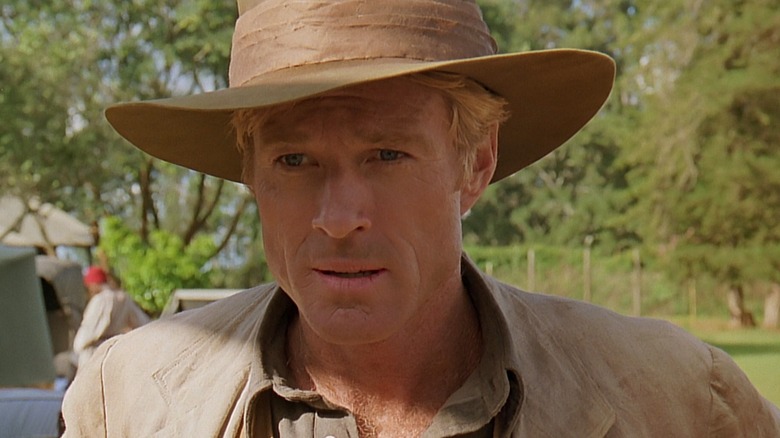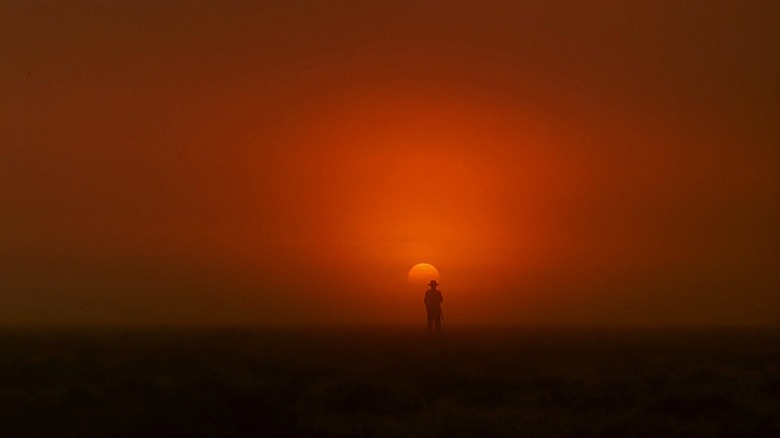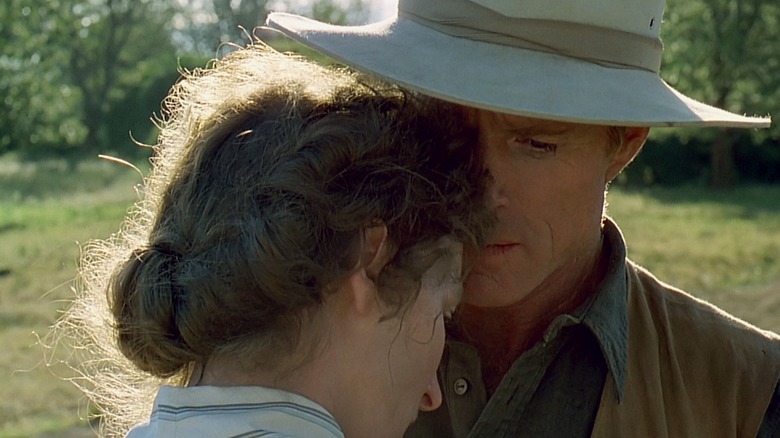This Oscar-Winning Robert Redford Movie Almost Starred Jeremy Irons Instead
The term "Oscar bait" dates back to the 1940s, first coined to describe a certain type of picture that appears to be deliberately geared towards snagging one of those little gold guys. For me, the '80s was the most Oscar-baity decade in the history of the Academy Awards, summed up by a series of staid, safe, and overly earnest films claiming the Best Picture prize: "Chariots of Fire," "Gandhi," "Terms of Endearment," and especially the controversial "Driving Miss Daisy." Although these movies were handsomely produced and impeccably acted, they were prestige pictures in the worst sense. Perhaps the peak '80s Oscar bait film was "Out of Africa," Sydney Pollack's snooze-inducing romantic drama starring Meryl Streep and Robert Redford. But might it have been a little spicier if Jeremy Irons was cast instead of Redford?
"Out of Africa" is a ponderous adaptation of the memoirs of Karen Blixen, the Danish author who wrote about her experiences living in British East Africa (now Kenya) in the early decades of the 20th Century. Streep, in superb form, stars as Karen, a wealthy young woman who is rejected by the love of her life and settles for his brother, Baron Bror Blixen (Klaus Maria Brandauer), instead. They marry and head out to Nairobi to start a farm on her fortune, meeting enigmatic big game hunter Denys Finch Hatton (Robert Redford) along the way. Once they're established, Bror is more interested in going off on safari than running a farm, leaving Karen on her own for months on end. Nevertheless, she is resourceful and grows to love the country and the locals, but the future is uncertain when World War I reaches Africa. Worse still for Karen's personal health, she contracts syphilis from her cheating husband. A tentative relationship blossoms between her and Hatton after she recovers, but, like the wilderness that provides a backdrop for their romance, the adventurer refuses to be tamed.
Blixen's book was first published in 1937 and the prospect of adapting it for the screen had bounced around Hollywood for decades, with big names including David Lean, Orson Welles, and Nicolas Roeg all potentially helming the picture. The film finally came to fruition thanks to Sydney Pollack, who produced and directed the movie coming off the back of "Tootsie," his multi-Oscar-nominated smash hit starring Dustin Hoffman. Streep won the female lead over Pollack's first choice, Audrey Hepburn, and there was a big decision to be made about who would star opposite her.
Why Robert Redford was chosen over Jeremy Irons
Sydney Pollack often gets left out of the conversation when it comes to great Hollywood directors, as he's perhaps better known as a serial producer of Oscar-friendly films (that and for acting in movies like "Eyes Wide Shut" and "Michael Clayton"). His pictures racked up a total of 48 Academy Award nods and won 11, and he was pretty handy behind the camera too. He earned three Oscar nominations for Best Director, winning once for "Out of Africa." He had plenty of resources at his disposal for that triumph. After the success of "Tootsie," he was entrusted with a decadent budget of $31 million (more than "Back to the Future," "Rocky IV," or "A View to a Kill" from the same year) to head off to Africa and film his adaptation of Karen Blixen's book.
A large chunk of that budget was Robert Redford's fee. For the crucial role of Denys Finch Hatton, Pollack and Universal head Frank Price found themselves weighing up two choices: spending $17 million on the picture with Jeremy Irons in the male lead or increasing the budget to secure Robert Redford's services instead. Redford was already a big star, and Pollack had directed him in several successful movies, including "Jeremiah Johnson," "The Way We Were," and "Three Days of the Condor."
Irons was also very well regarded. The British actor graduated from the Bristol Old Theatre School and enjoyed a successful stage run (including a Tony Award win for "The Real Thing") before moving to television, where he made a big impact in "Brideshead Revisited." His performance in the acclaimed period drama earned him a hat-trick of nominations at the BAFTAs, Golden Globes, and Emmy Awards, which could only mean the big screen was now beckoning. He made the leap effortlessly, receiving further plaudits alongside Meryl Streep in "The French Lieutenant's Woman." Teaming them up again for "Out of Africa" would have been a big-hitting reunion, but he was still a relative unknown in Hollywood at that point in his career. Ultimately, casting Hatton boiled down to economics for Price and Pollack (via Deadline):
"I thought, I can't depend on how the picture turns out, even though Sydney was such a great director. If the $17 million Irons picture didn't work, that would get me in trouble, but with Redford at $10 million more, the performance in ancillary markets was insured, no matter how it turned out. So, the safest bet was Redford."
How would Out of Africa play with Jeremy Irons instead of Robert Redford?
Although it doesn't rank among the absolute worst Best Picture Oscar winners of all time, "Out of Africa" is pretty tedious stuff. For such a lavishly mounted film spanning two decades of a person's life during a tumultuous period in world history, the movie's 160 minutes pass almost without incident. The film lumbers to life during Blixen's journey to take vital supplies to the colonial forces after the outbreak of the war and a few dangerous encounters with the local wildlife, but these moments are short-lived as the narrative settles back into its picturesque torpor once again. Even the central romance between Blixen and Hatton doesn't really get going until well into the second hour, and Redford couldn't appear much less interested. He looks the part but he sleepwalks through his performance, delivering his smug dialogue as if he is reading it from cue cards.
That's why Jeremy Irons would have been much better in the role. He might not have Redford's matinee idol looks, but he sure makes up for it with his sheer intensity and charisma. Casting Irons as Hatton would have considerably changed the tone of the character, and perhaps the whole film. The actor often brings an aloof quality of chilly intelligence to his best characters, as we saw in "Dead Ringers" and his Oscar-winning turn in "Reversal of Fortune." Hatton would have become a more calculating presence, and I imagine "Out of Africa" would have felt more like "The English Patient" (with its mercurial swirl of complex passions).
But we got Mr. Big Bucks Redford instead, and his comatose performance is the worst thing about the film. Meryl Streep deserved far better, no matter what you think about her attempted Danish accent. She's in virtually every scene and carries the whole movie almost single-handedly in the acting stakes for over two-and-a-half hours. I'm not always her biggest fan because I find her a tad hammy in her more recent roles; she's also become the ultimate Oscar-baiting actor, only needing to show up in a film to receive a nomination (see: "Florence Foster Jenkins"). "Out of Africa" was still early in her career, back when she could command the screen with her presence without playing to the gallery. Redford and the rest of the film are a bore, but this is among Streep's best performances.


